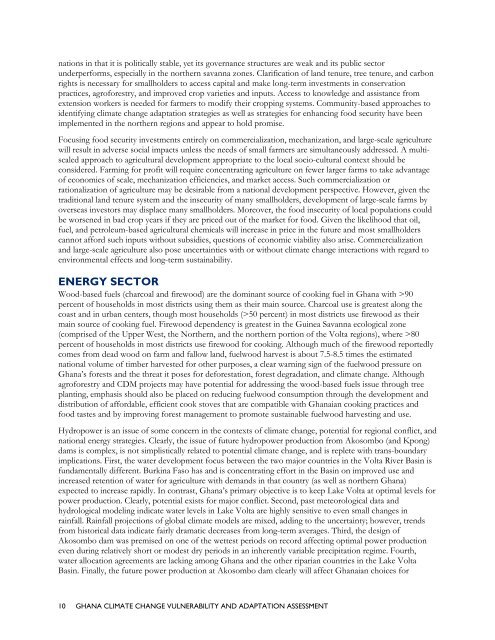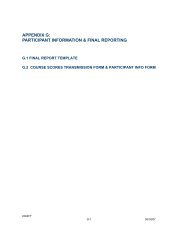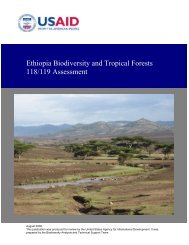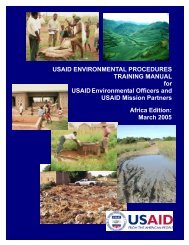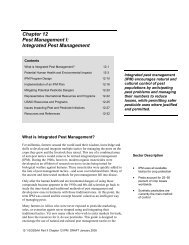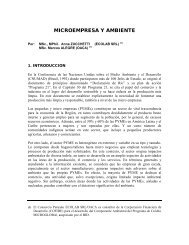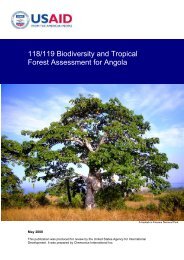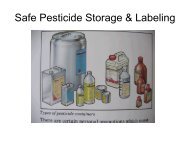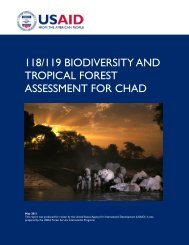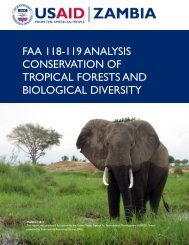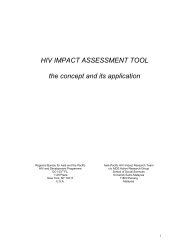ghana climate change vulnerability and adaptation assessment
ghana climate change vulnerability and adaptation assessment
ghana climate change vulnerability and adaptation assessment
- No tags were found...
Create successful ePaper yourself
Turn your PDF publications into a flip-book with our unique Google optimized e-Paper software.
nations in that it is politically stable, yet its governance structures are weak <strong>and</strong> its public sectorunderperforms, especially in the northern savanna zones. Clarification of l<strong>and</strong> tenure, tree tenure, <strong>and</strong> carbonrights is necessary for smallholders to access capital <strong>and</strong> make long-term investments in conservationpractices, agroforestry, <strong>and</strong> improved crop varieties <strong>and</strong> inputs. Access to knowledge <strong>and</strong> assistance fromextension workers is needed for farmers to modify their cropping systems. Community-based approaches toidentifying <strong>climate</strong> <strong>change</strong> <strong>adaptation</strong> strategies as well as strategies for enhancing food security have beenimplemented in the northern regions <strong>and</strong> appear to hold promise.Focusing food security investments entirely on commercialization, mechanization, <strong>and</strong> large-scale agriculturewill result in adverse social impacts unless the needs of small farmers are simultaneously addressed. A multiscaledapproach to agricultural development appropriate to the local socio-cultural context should beconsidered. Farming for profit will require concentrating agriculture on fewer larger farms to take advantageof economies of scale, mechanization efficiencies, <strong>and</strong> market access. Such commercialization orrationalization of agriculture may be desirable from a national development perspective. However, given thetraditional l<strong>and</strong> tenure system <strong>and</strong> the insecurity of many smallholders, development of large-scale farms byoverseas investors may displace many smallholders. Moreover, the food insecurity of local populations couldbe worsened in bad crop years if they are priced out of the market for food. Given the likelihood that oil,fuel, <strong>and</strong> petroleum-based agricultural chemicals will increase in price in the future <strong>and</strong> most smallholderscannot afford such inputs without subsidies, questions of economic viability also arise. Commercialization<strong>and</strong> large-scale agriculture also pose uncertainties with or without <strong>climate</strong> <strong>change</strong> interactions with regard toenvironmental effects <strong>and</strong> long-term sustainability.ENERGY SECTORWood-based fuels (charcoal <strong>and</strong> firewood) are the dominant source of cooking fuel in Ghana with >90percent of households in most districts using them as their main source. Charcoal use is greatest along thecoast <strong>and</strong> in urban centers, though most households (>50 percent) in most districts use firewood as theirmain source of cooking fuel. Firewood dependency is greatest in the Guinea Savanna ecological zone(comprised of the Upper West, the Northern, <strong>and</strong> the northern portion of the Volta regions), where >80percent of households in most districts use firewood for cooking. Although much of the firewood reportedlycomes from dead wood on farm <strong>and</strong> fallow l<strong>and</strong>, fuelwood harvest is about 7.5-8.5 times the estimatednational volume of timber harvested for other purposes, a clear warning sign of the fuelwood pressure onGhana’s forests <strong>and</strong> the threat it poses for deforestation, forest degradation, <strong>and</strong> <strong>climate</strong> <strong>change</strong>. Althoughagroforestry <strong>and</strong> CDM projects may have potential for addressing the wood-based fuels issue through treeplanting, emphasis should also be placed on reducing fuelwood consumption through the development <strong>and</strong>distribution of affordable, efficient cook stoves that are compatible with Ghanaian cooking practices <strong>and</strong>food tastes <strong>and</strong> by improving forest management to promote sustainable fuelwood harvesting <strong>and</strong> use.Hydropower is an issue of some concern in the contexts of <strong>climate</strong> <strong>change</strong>, potential for regional conflict, <strong>and</strong>national energy strategies. Clearly, the issue of future hydropower production from Akosombo (<strong>and</strong> Kpong)dams is complex, is not simplistically related to potential <strong>climate</strong> <strong>change</strong>, <strong>and</strong> is replete with trans-boundaryimplications. First, the water development focus between the two major countries in the Volta River Basin isfundamentally different. Burkina Faso has <strong>and</strong> is concentrating effort in the Basin on improved use <strong>and</strong>increased retention of water for agriculture with dem<strong>and</strong>s in that country (as well as northern Ghana)expected to increase rapidly. In contrast, Ghana’s primary objective is to keep Lake Volta at optimal levels forpower production. Clearly, potential exists for major conflict. Second, past meteorological data <strong>and</strong>hydrological modeling indicate water levels in Lake Volta are highly sensitive to even small <strong>change</strong>s inrainfall. Rainfall projections of global <strong>climate</strong> models are mixed, adding to the uncertainty; however, trendsfrom historical data indicate fairly dramatic decreases from long-term averages. Third, the design ofAkosombo dam was premised on one of the wettest periods on record affecting optimal power productioneven during relatively short or modest dry periods in an inherently variable precipitation regime. Fourth,water allocation agreements are lacking among Ghana <strong>and</strong> the other riparian countries in the Lake VoltaBasin. Finally, the future power production at Akosombo dam clearly will affect Ghanaian choices for10 GHANA CLIMATE CHANGE VULNERABILITY AND ADAPTATION ASSESSMENT


